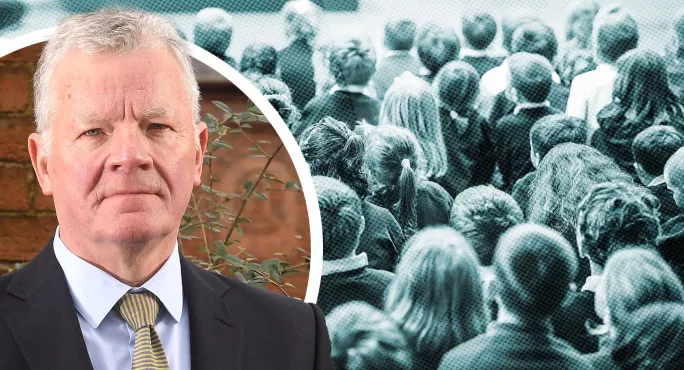Sir Kevan Collins has called for tighter admissions rules, warning that the intake of some top-performing schools does not reflect the disadvantage in their surrounding communities.
Speaking at a panel discussion today on closing the disadvantage gap, the former education recovery commissioner warned that the system was not ensuring that disadvantaged children can access all their schools of choice.
He also voiced his regret at the government’s decision not to continue tutoring funding beyond this year.
Sir Kevan, who spoke to Tes last week about his resignation as “catch-up tsar” after the government failed to support his recovery plan, was on a panel of speakers at an event hosted by the Sutton Trust this afternoon.
During the session, the panel was told that the disadvantage gap had narrowed between 2010 and 2017 before jumping up after the pandemic
Sir Kevan warned that people should not look at pre-Covid times through “rose-tinted glasses” as although progress had been made, the country was still decades away from closing the gap.
Asked why some schools were less inclusive towards disadvantaged pupils, he said: “When you look at the allocation of children against some of our top performing schools...in grammar schools definitely, but even in our top performing non-grammar schools, and then you look at the level of kids on free school meals around those schools, you see a strange pattern where those schools aren’t serving the population in which they are located.”
He added: “We have to ask ourselves the question: ‘Why aren’t all schools reflecting the communities they serve?’ And I think that’s an admission question...we know that some schools generate better progress than others, we know that if you get lots and lots of children who are harder to teach, it has an impact on your capacity as a school.”
Sir Kevan said that admissions should be “much more tightly managed to ensure that each school is serving the community, the children of the community around it and not have these weird disconnects between a school operating in a community with deprivation but actually not serving those children”.
He also questioned whether accountability and incentive systems in schools supported disadvantaged pupils.
He said: “On admissions, are we making sure that our disadvantaged kids get access to all schools of choice? It doesn’t look like it, looking at the data. Are we allocating our staff and our resources to teach the hardest-to-teach children? It doesn’t look like it.”
Sir Kevan lamented the government’s decision not to continue with the National Tutoring Programme beyond this year.
He said: “I think it was such a shame, as tutoring was one of the first times we were beginning to move the furniture and do something fundamental to give children more opportunities, and it looks like that is withering because the government won’t continue to fund it.”
During the session, the former education recovery commissioner also suggested that there had been a missed opportunity to build on parents’ increased engagement in education during the lockdowns.
He told the panel that parents got engaged in children’s learning in really exciting ways and added: “One of my disappointments is we haven’t captured that legacy...because then we’ve moved to a debate around fining parents.”
The fine for unauthorised absence is increasing from £60 to £80 under plans announced by the Department for Education last month.
Sir Kevan said that parental engagement in that “Covid moment” should have been “celebrated and recognised”, and used as a platform for further work.
For the latest education news and analysis delivered directly to your inbox every weekday morning, sign up to the Tes Daily newsletter




